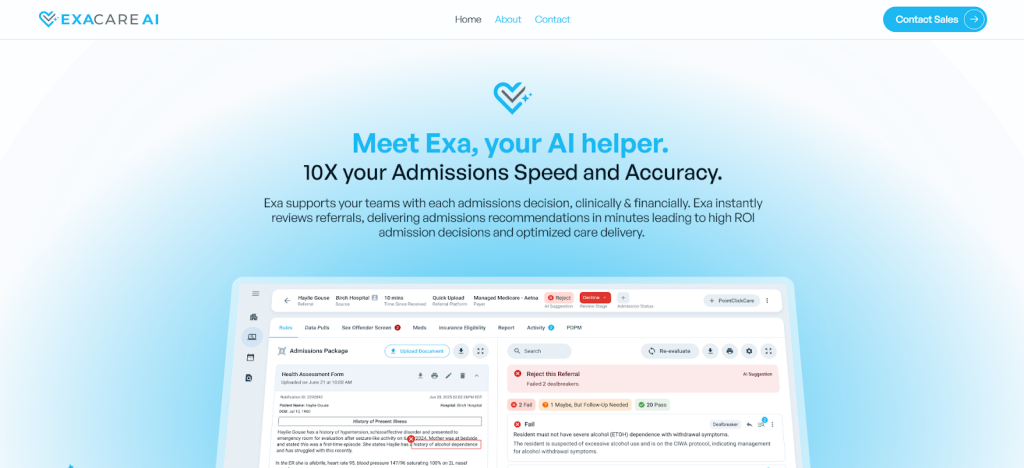ExaCare AI Raises $30M Series A Led by Insight Partners to Redefine Critical Care Monitoring
October 23, 2025
byFenoms Start-Up Research

ExaCare AI has secured $30 million in Series A funding, a powerful endorsement led by Insight Partners, with participation from Foundation Capital, Bienville Capital, and other strategic investors. The round marks a pivotal moment for the company as it accelerates its mission to revolutionize critical care monitoring through artificial intelligence.
Founded by Laird Russell, ExaCare AI was built on a simple but urgent premise - in critical care, seconds save lives. The company’s platform transforms real-time patient data into actionable insights that help clinicians anticipate deterioration before it becomes catastrophic. By integrating seamlessly into hospital workflows, ExaCare allows medical teams to make faster, more confident decisions, even in the most high-pressure environments.
The New Standard in Predictive Critical Care
Modern ICUs generate enormous volumes of data - from ventilator settings to oxygen levels and lab results. Historically, this flood of information overwhelmed clinicians rather than empowering them. ExaCare AI flips that paradigm by using deep learning models to continuously interpret these signals and detect subtle physiological shifts long before traditional alarms would trigger.
This continuous, context-aware monitoring doesn’t just identify problems earlier - it redefines the nature of medical response. ExaCare’s models analyze data across time, drawing correlations that traditional systems can’t see, offering predictions instead of alerts. Hospitals adopting ExaCare are seeing not just fewer false alarms, but earlier interventions that prevent critical decline altogether.
As part of its growth strategy following the $30 million Series A raise, ExaCare plans to expand its deployments across hospital networks, enhance its regulatory pathways, and strengthen data partnerships with major healthcare institutions. The involvement of Insight Partners and Foundation Capital gives the startup both the resources and validation to scale responsibly in a deeply regulated sector.
Scaling Trust in AI-Not Just Models
Healthcare AI isn’t just about accuracy; it’s about trust. Clinicians must believe the system understands the gravity of each signal it surfaces. ExaCare’s edge lies in its focus on interpretability - surfacing not only predictions but the “why” behind each one. The company’s architecture emphasizes transparency, explainability, and a feedback loop between human and machine judgment that strengthens over time.
And this is where the real insight for founders emerges - trust scales slower than technology, but it compounds harder. Every founder building in a high-stakes field faces this paradox. You can innovate faster than regulators, move faster than incumbents, but you can’t outpace the velocity of human trust. The startups that win in sensitive sectors - healthcare, finance, energy - are those that design for adoption, not disruption.
ExaCare’s model of success lies in its deliberate pacing. By embedding clinical teams into its product development cycle, it avoids the classic pitfall of tech arrogance: assuming the problem is technological when it’s actually behavioral. Founders often chase velocity, but ExaCare reminds us that precision of alignment - with users, with systems, with regulators - is a deeper competitive advantage than speed. Speed gets you funded; alignment gets you integrated.
When you’re building technology that asks professionals to make high-stakes decisions differently, you’re not competing for users - you’re competing for belief. That’s a harder, slower, but infinitely more durable race to win.
Building the Infrastructure for Predictive Care
The Series A funding will allow ExaCare AI to extend its predictive care solutions across intensive care units globally, focusing on deeper integrations with electronic health records (EHRs) and medical device systems. By bridging disparate hospital data sources, the platform aims to provide unified, real-time patient visibility - giving clinicians a single, intelligent interface for decision-making.
This funding also supports ExaCare’s efforts in regulatory validation and data standardization, critical for scaling medical AI systems across borders. Insight Partners’ experience in scaling data-heavy, mission-critical software platforms provides a strong foundation for ExaCare’s next phase of growth.
The company’s roadmap includes expanding its model library to cover new critical care use cases such as sepsis prediction, ventilator management, and post-operative recovery. Each of these applications demands both technical accuracy and clinical credibility - a dual challenge that few AI startups manage to balance effectively.
Why ExaCare’s Series A Matters Beyond Healthcare
ExaCare’s $30 million raise signals a broader inflection point for the AI-in-healthcare movement. Investors are no longer chasing novelty; they’re backing deployment readiness - solutions that can operate at scale within real hospital systems, governed by real-world constraints.
The lesson here extends far beyond healthcare: AI companies that outlearn their customers scale faster than those that outbuild them. ExaCare’s success lies not in its algorithms alone, but in how intimately it learns from clinicians - turning feedback into precision and uncertainty into design. That learning loop is the true moat in AI today.
As the healthcare industry faces mounting strain - from clinician burnout to ICU overcrowding - ExaCare’s predictive intelligence offers a timely, tangible form of relief. It’s no longer about automating decisions, but amplifying human judgment through better data. That distinction defines the next era of applied AI: systems that don’t replace professionals but make their expertise exponential.With Insight Partners, Foundation Capital, and Bienville Capital backing its vision, ExaCare AI is not merely building another diagnostic tool - it’s constructing the neural layer of future hospitals. The raise is both a funding milestone and a signal of where healthcare is headed: toward proactive, data-driven, trust-centered medicine.









